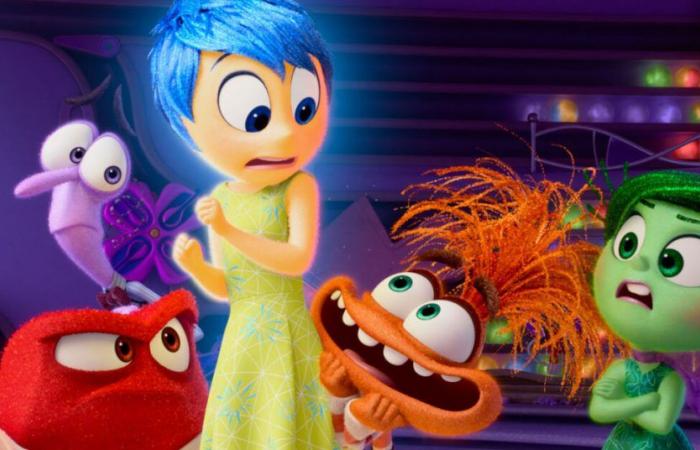“Anxiety, Envy, Embarrassment, Boredom, Nostalgia. No, this is not a summary of my week (yet!) but the names of the characters who appear in Vice-Versa 2the second installment of the Pixar saga that takes us inside the head of teenage Riley – after exploring the emotions of her early childhood in 2015. The young heroine discovers these five new hosts in the control tower of her brain at puberty. A big upheaval for her, and for us, an opportunity to question the links between inner emotions and morality.
➤ You are currently reading the Editor’s Letter from Philosophy magazine. To receive it directly in your inbox, subscribe! This newsletter is daily and free.
So far, Riley has known five emotions: Joy, Anger, Sadness, Fear and Disgust. When the new quintet arrives, the teenager’s psychological life is shaken. General alert! One emotion quickly takes over: Anxiety, a puny orange creature with shaggy hair and a swollen mouth, which supplants Joy as chief regulator of emotions. Riley is indeed torn between her childhood friends, who will leave school next year (anxiety), and a group of ultra-cool that she clumsily tries to impress (anxiety, again). The classic adolescent malaise: “I’m not good enough”repeats the little voice inside the young girl. Not good enough at hockey, not nonchalant or funny enough… The whole challenge of the film will be to dispel this Anxiety to put Joy back at the center of operations.
What is an emotion – main theme of the film? This notion can be defined as the bodily manifestation of a mental state, which is also indicated by the etymology (to move in Latin, “to make move”). Unlike feelings, emotions presuppose that something is happening in the body: a blush, a sudden gesture, a smile, widening eyes… It is difficult to repress one’s emotions, since they constitute a reaction to a situation that often escapes us. Let us nevertheless learn to deal with it, tells us Vice-Versa 2. Hence the central idea defended by Pixar, according to which “all emotions are good”. The character of Joie delivers this sentence at the beginning to reassure herself in the face of her new comrades, whom she struggles to control.
All emotions are good, really? At first glance, one would be tempted to agree with this. How could one blame Riley for feeling what she feels? Isn’t it legitimate to be angry, to be bored or to jump for joy as she does? The premise of Vice-Versa 2 is that emotions are primary, at the foundation of our psychological life, that they testify to our vitality, to our authentic personality and are therefore difficult to disqualify as such. Riley has the right to be Riley and therefore to be moved like Riley. Even though these emotions might go off the rails from time to time, they could be tempered by… other emotions. This is evidenced by the narrative peak where Joy (and not reason, as one might have expected) manages to calm Anxiety while Riley has an anxiety attack during a match.
In Vice-Versa 2the moral vocabulary (“good”) is repeated over and over again, but there is never really any question of morality. For what ? I would hypothesize this: Riley has no Superego. The teenager is alone in her brain, as if no one but herself is teaching her what is considered good or bad in life. Society’s prohibitions? Parents’ warnings? A possible innate sense of good and evil? None of this exists. In the head of the schoolgirl, there is no prior filter for emotions. Riley is nature. Already herself. If she’s afraid of one thing, it’s being unloved, not disobeying a rule. This is precisely why she only blames herself throughout the entire film. Being a “good person” boils down to being a person capable of controlling their emotions, not to acting according to a higher moral law that reason, for example, would have succeeded in clearing.
It will come as no surprise that a mainstream film refuses to venture into the realm of psychoanalysis, a discipline that is not very consensual and itself divided into almost irreconcilable factions. On the other hand, one can regret the absence of dialectic between emotions on the one hand, and on the other hand, the psychic instances responsible for their modulation – not to say their conditioning – not in endorsement more upstream of our personality, in their very formation. Because inner transports are indeed social constructions as much, if not more, than natural emanations of our Self. In this, certain emotions can also turn out to be bad. This negation – denial? – of the composite dimension of emotions finally explains why one of them is notoriously absent from a work on youth: desire, or to be more precise, theexcitation. A teenager who talks about hockey 24/7 but never about the person who makes her heart beat a hundred miles an hour, only Hollywood would ask us to believe it! »
Expresso: interactive courses
Epicurus and happiness
Why do we have so much trouble being happy? Because we do not follow the correct path to achieve happiness, explains Epicurus, who suggests his own path.






